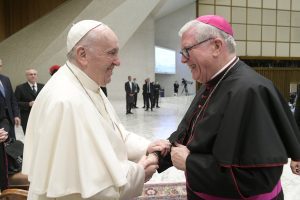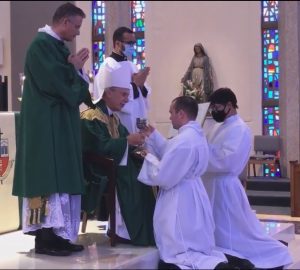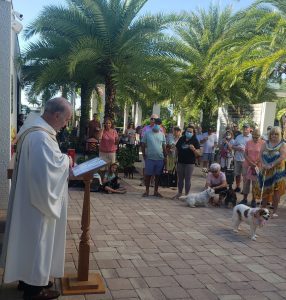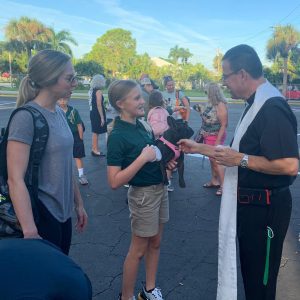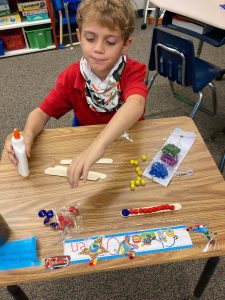A friendship lasting a quarter-century finds its roots in the Second Vatican Council Declaration Nostrae Aetate (On the Relation of the Church to Non-Christian Religions), the important document that called for a fresh and positive relationship between the Catholic and Jewish Faiths.
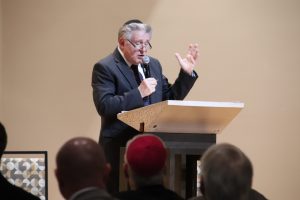 Rabbi Abraham Skorka and Pope Francis have served as examples of friendship and interreligious dialogue because they have lived out the call of Nostrae Aetate which acknowledges the Church’s bond with the Jewish people.
Rabbi Abraham Skorka and Pope Francis have served as examples of friendship and interreligious dialogue because they have lived out the call of Nostrae Aetate which acknowledges the Church’s bond with the Jewish people.
Rabbi Skorka was the keynote speaker at the April 3, 2022, gathering of the Catholic-Jewish Dialogue of Collier County at St. John the Evangelist Parish in Naples. The presentation was co-sponsored by the Diocese of Venice and Jewish Federation of Greater Naples.
“One of the values I learned from my parents and grandparents was that speech between peoples should reflect the way that people ought to relate to each other with moderation, sincerity and honesty,” Rabbi Skorka explained, noting that the friendship with Pope Francis began as an open exchange of ideas with then Archbishop Jorge Bergoglio of the Archdiocese of Buenos Aires. Rabbi Skorka was the leading Rabbi in Argentina as Rector of the Seminario Rabínico Latinoamericano (Latin American Rabbinical Seminary), in Buenos Aires.
The Rabbi explained that the Holocaust, and its lasting impacts, was a reality that marked his being since childhood.
“The travails of the Jewish people took palpable form in my family which was decimated by the massacre (of the Holocaust). It was not merely historical fact as a Jew I should remember; what stays with me was the sadness which overwhelmed the members of my family and the many members of the community in which I was a part. The Shoah and anti-Semitism were not simply recounted to me; it was an experience that also shaped me by being imparted by many who suffered in their native Europe.”
When he began his rabbinical studies, Rabbi Skorka learned a great deal about Nostrae Aetate, which was released in 1965 by St. John XIII. While the document was short, it served as a profound and absolute apology for years of divisiveness between the Catholic and Jewish faiths.
Inspired by the knowledge and understanding that no religion is an island, Rabbi Skorka openly wrote about the need for interfaith dialogue. One such article brought the Rabbi and Archbishop into contact, forming a lasting bond centered on the belief that the only way to overcome hatred was through the encounter of the members of different religions and cultures.
The Rabbi went on to say that Pope Francis has a profound ability to identify with the Jewish experience. This was evident in his instinctive understanding from the very beginning that dialogue between Catholics and Jews would become untenable if Catholics harbored any thought of “converting” Jews to Jesus Christ.
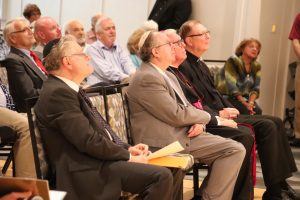 Bishop Frank J. Dewane also addressed the Catholic-Jewish Dialogue gathering, talking about the noble mission of the group.
Bishop Frank J. Dewane also addressed the Catholic-Jewish Dialogue gathering, talking about the noble mission of the group.
Bishop Dewane said that the advancement of Catholic-Jewish relations comes directly from Nostrae Aetate, which should be celebrated. The document changed the landscape of the Church and was done with prudence and love, started a completely new conversation within the Catholic Church.
This new moment in the Church’s history had its roots in a renewed study of Hebrew and Christian Scripture and other theological developments that had occurred at the Second Vatican Council.
Bishop Dewane explained how Pope John Paul II led a revolution that transformed relations between the Catholic Church and the Jewish people. Pope John Paul II was the first Pope to visit a Jewish synagogue and the Western Wall. He then established diplomatic relations with Israel, applying the term “beloved elder brothers” when referring to the Jews.”
The Bishop explained that the development of Nostrae Aetate’s principle themes reshaped specific expression of Catholic Teaching, which had posed obstacles to Jewish-Catholic relations.
“The long road ahead is marked by our two communities of faith in a relatively short time since the Second Vatican Council and has yielded immense fruit and I believe there are practical ways in which we can build on these developments,” Bishop Dewane continued. “We need to share our concerns on an increasingly hostile culture and especially a growing antagonism toward people of faith… We can find a common purpose in standing up against these acts as people of faith… Any one act against faith is too much. We all need to speak up, each one within our tradition, within our faith perspective. In this environment we face today we must also see increased positive collaboration to deepen friendships as we moved forward together.”
Michael Feldman, member of the Catholic Jewish-Dialogue served as the program emcee. Other speakers included Rabbi Frank Muller, Father Bob Kantor of St. Agnes Parish, as well as Catholic-Jewish Dialogue Co-Chairs Luba Rotsztain and Martin Gauthier.





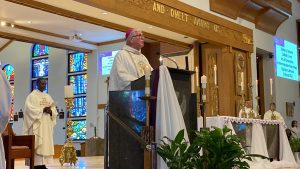 Pope Francis wrote to all the Bishops in the world, asking them to join him in offering “a solemn Act of Consecration of humanity, and Russia and Ukraine in particular, to the Immaculate Heart of Mary.” The Act of Consecration took place on the Solemnity of the Annunciation of the Lord, when the Angel Gabriel told Mary that she would conceive and bear “the Son of the Most High” through the power of the Holy Spirit.
Pope Francis wrote to all the Bishops in the world, asking them to join him in offering “a solemn Act of Consecration of humanity, and Russia and Ukraine in particular, to the Immaculate Heart of Mary.” The Act of Consecration took place on the Solemnity of the Annunciation of the Lord, when the Angel Gabriel told Mary that she would conceive and bear “the Son of the Most High” through the power of the Holy Spirit.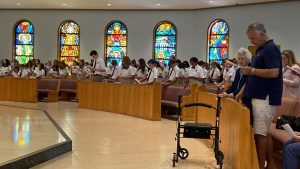 In a nearly full Cathedral, including students from Epiphany Cathedral Catholic School, Bishop Dewane remarked how important it was that the faithful gather “as a people of God, brothers and sisters in Christ, in response to the Holy Father. We gather to pray for the conflict going on in the Ukraine and the suffering that has been inflicted upon the people of Ukraine. It is a Consecration of humanity, as the Holy Father put it – in particular for those in Russia and Ukraine. This is a gesture of not just the Pope, Bishops, or priests, but of the Universal Church.”
In a nearly full Cathedral, including students from Epiphany Cathedral Catholic School, Bishop Dewane remarked how important it was that the faithful gather “as a people of God, brothers and sisters in Christ, in response to the Holy Father. We gather to pray for the conflict going on in the Ukraine and the suffering that has been inflicted upon the people of Ukraine. It is a Consecration of humanity, as the Holy Father put it – in particular for those in Russia and Ukraine. This is a gesture of not just the Pope, Bishops, or priests, but of the Universal Church.”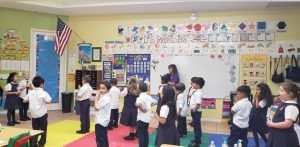 For example, students at St. Catherine Catholic School in Sebring joined in the Consecration by praying the rosary. Students at Bishop Verot Catholic High School in Fort Myers gathered in their courtyard to recite the Act of Consecration. At Incarnation Parish in Sarasota, the faithful, as well as students from Incarnation Catholic School joined together. The Consecration also included time for Adoration of the Blessed Sacrament.
For example, students at St. Catherine Catholic School in Sebring joined in the Consecration by praying the rosary. Students at Bishop Verot Catholic High School in Fort Myers gathered in their courtyard to recite the Act of Consecration. At Incarnation Parish in Sarasota, the faithful, as well as students from Incarnation Catholic School joined together. The Consecration also included time for Adoration of the Blessed Sacrament.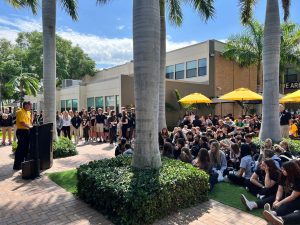 Pope Francis said during remarks from Rome that the consecration “is no magic formula but a spiritual act… It is an act of complete trust on the part of children who, amid the tribulation of this cruel and senseless war that threatens our world, turn to their Mother, reposing all their fears and pain in Her Heart and abandoning themselves to Her.”
Pope Francis said during remarks from Rome that the consecration “is no magic formula but a spiritual act… It is an act of complete trust on the part of children who, amid the tribulation of this cruel and senseless war that threatens our world, turn to their Mother, reposing all their fears and pain in Her Heart and abandoning themselves to Her.”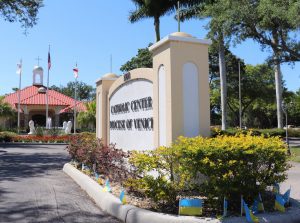 Bishop Dewane added that the Act of Consecration “is about people who are suffering. The Lord calls us to be His instruments and to pray and to call upon our Faith; to call upon Christ; to call upon the saints; to intervene to relieve that suffering that we see so much of – also intervene in that war in Ukraine.”
Bishop Dewane added that the Act of Consecration “is about people who are suffering. The Lord calls us to be His instruments and to pray and to call upon our Faith; to call upon Christ; to call upon the saints; to intervene to relieve that suffering that we see so much of – also intervene in that war in Ukraine.”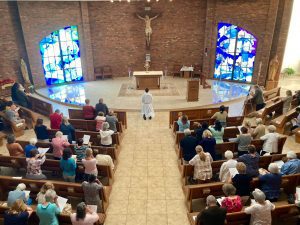 The practice of Consecration to the Immaculate Heart of Mary is closely linked to the apparitions of Our Lady of Fatima. During the third apparition, on July 13, 1917, the Blessed Virgin Mary told three visionaries that God sought to establish the devotion to Mary’s Immaculate Heart in the world, stating that if this request was not granted, Russia would “spread her errors throughout the world, causing wars and persecutions of the Church.” Pope Francis, and previous Popes, have led various consecrations to the Immaculate Heart of Mary, for example, St. John Paul II’s consecration of Russia to the Immaculate Heart of Mary on March 25, 1984.
The practice of Consecration to the Immaculate Heart of Mary is closely linked to the apparitions of Our Lady of Fatima. During the third apparition, on July 13, 1917, the Blessed Virgin Mary told three visionaries that God sought to establish the devotion to Mary’s Immaculate Heart in the world, stating that if this request was not granted, Russia would “spread her errors throughout the world, causing wars and persecutions of the Church.” Pope Francis, and previous Popes, have led various consecrations to the Immaculate Heart of Mary, for example, St. John Paul II’s consecration of Russia to the Immaculate Heart of Mary on March 25, 1984.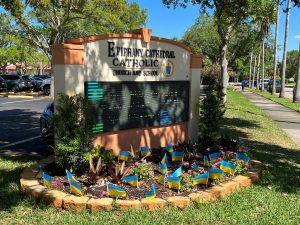 Bishop Dewane has stressed the importance of continued prayer for those suffering. Also, the Diocese of Venice has made it possible for the faithful to contribute toward charitable relief and assist in providing humanitarian aid, as well as necessary recovery efforts.
Bishop Dewane has stressed the importance of continued prayer for those suffering. Also, the Diocese of Venice has made it possible for the faithful to contribute toward charitable relief and assist in providing humanitarian aid, as well as necessary recovery efforts.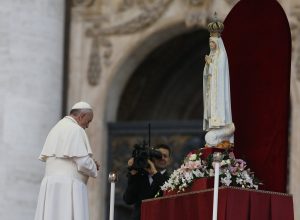 The Consecration will take place at Epiphany Cathedral, 350 Tampa Ave. W., Venice, beginning at noon with the Prayer of Consecration and followed by the Mass. All are invited to participate. The Consecration and Mass will also be livestreamed via Facebook.
The Consecration will take place at Epiphany Cathedral, 350 Tampa Ave. W., Venice, beginning at noon with the Prayer of Consecration and followed by the Mass. All are invited to participate. The Consecration and Mass will also be livestreamed via Facebook.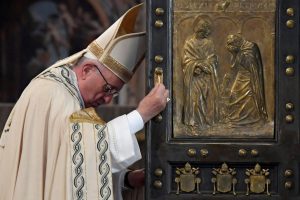 The Holy Father said his hope is that we can recover “a sense of universal fraternity and refuse to turn a blind eye to the tragedy of rampant poverty that prevents millions of men, women, young people and children from living in a manner worthy of our human dignity.” This highlight of hope by the Holy Father comes at a time of war in the Ukraine.
The Holy Father said his hope is that we can recover “a sense of universal fraternity and refuse to turn a blind eye to the tragedy of rampant poverty that prevents millions of men, women, young people and children from living in a manner worthy of our human dignity.” This highlight of hope by the Holy Father comes at a time of war in the Ukraine.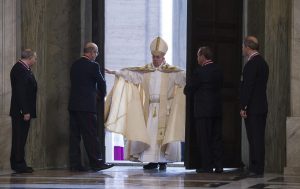 The Holy Father said that a significant step on this journey was already taken with the celebration of the Extraordinary Jubilee of Mercy (2016), “which allowed us to appreciate anew all the power and tenderness of the Father’s merciful love, in order to become, in turn, its witness.”
The Holy Father said that a significant step on this journey was already taken with the celebration of the Extraordinary Jubilee of Mercy (2016), “which allowed us to appreciate anew all the power and tenderness of the Father’s merciful love, in order to become, in turn, its witness.”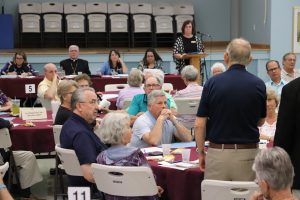 Some 115 people participated on Feb. 16, 2022, at Epiphany Cathedral in Venice, and then another 100 participated on Feb. 22 at Ss. Peter and Paul the Apostles Parish in Bradenton. The Bradenton Listening Session was offered in both English and Spanish.
Some 115 people participated on Feb. 16, 2022, at Epiphany Cathedral in Venice, and then another 100 participated on Feb. 22 at Ss. Peter and Paul the Apostles Parish in Bradenton. The Bradenton Listening Session was offered in both English and Spanish.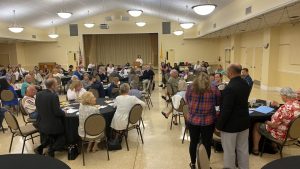 The second main theme which is under consideration is “Listening.” This theme is described by the Synod as follows: “The synodal process necessitates that we, as the People of God, first listen with an open heart and open mind to where the Spirit is calling us and discern to whom we are needing to listen and what steps need to be take to more fully live out our mission.”
The second main theme which is under consideration is “Listening.” This theme is described by the Synod as follows: “The synodal process necessitates that we, as the People of God, first listen with an open heart and open mind to where the Spirit is calling us and discern to whom we are needing to listen and what steps need to be take to more fully live out our mission.”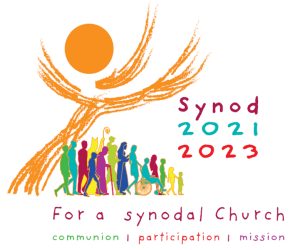
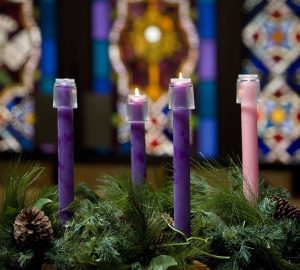 Advent begins on Nov. 28, 2021, the start of the new Liturgical Year, therefore it is appropriate to begin anew and raise one’s heart and mind to Christ’s second coming at the end of time and prepare for the celebration of the anniversary of the Lord’s birth.
Advent begins on Nov. 28, 2021, the start of the new Liturgical Year, therefore it is appropriate to begin anew and raise one’s heart and mind to Christ’s second coming at the end of time and prepare for the celebration of the anniversary of the Lord’s birth.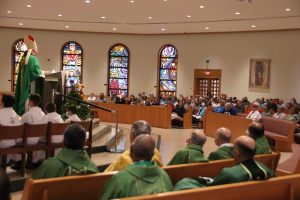 Participating in the Mass were more than a dozen priests, as well as some 300 people from across the Diocese, representing many Parishes, various movements, Third Orders and many more.
Participating in the Mass were more than a dozen priests, as well as some 300 people from across the Diocese, representing many Parishes, various movements, Third Orders and many more.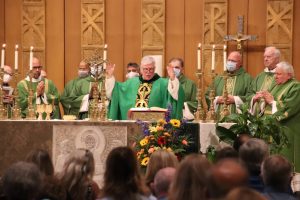 The sessions are being planned to allow for the maximum opportunity for as many of the faithful to participate as possible. A complete schedule of the listening sessions will be announced soon.
The sessions are being planned to allow for the maximum opportunity for as many of the faithful to participate as possible. A complete schedule of the listening sessions will be announced soon.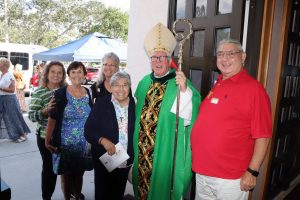 “While what comes from our Diocese will go to the U.S. Conference of Catholic Bishops (USCCB), we are not tasked with putting together a document. We are tasked to listen, to get input, put it together and ensure the points that are made at the Diocesan level.
“While what comes from our Diocese will go to the U.S. Conference of Catholic Bishops (USCCB), we are not tasked with putting together a document. We are tasked to listen, to get input, put it together and ensure the points that are made at the Diocesan level.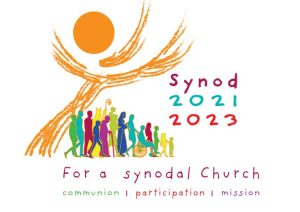 As a part of the XVI Ordinary General Assembly of the Synod of Bishops, “For a Synodal Church: Communion, Participation, and Mission,” Pope Francis has invited every Diocese in the world to inaugurate the beginning of the Synod with an opening Mass. In the Diocese of Venice, this opening Mass will be celebrated by Bishop Frank J. Dewane at 2:30 p.m., Oct. 17, 2021, at Epiphany Cathedral, 350 Tampa Ave., Venice. All are welcome and encouraged to attend this Mass. In this Diocesan Phase of the Synod, Catholics in the Diocese of Venice are encouraged to participate in listening sessions, which will be announced in the coming weeks.
As a part of the XVI Ordinary General Assembly of the Synod of Bishops, “For a Synodal Church: Communion, Participation, and Mission,” Pope Francis has invited every Diocese in the world to inaugurate the beginning of the Synod with an opening Mass. In the Diocese of Venice, this opening Mass will be celebrated by Bishop Frank J. Dewane at 2:30 p.m., Oct. 17, 2021, at Epiphany Cathedral, 350 Tampa Ave., Venice. All are welcome and encouraged to attend this Mass. In this Diocesan Phase of the Synod, Catholics in the Diocese of Venice are encouraged to participate in listening sessions, which will be announced in the coming weeks.